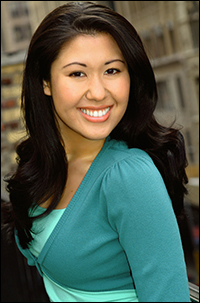
*
"Imelda or Bust!" became Ruthie Ann Miles' motto when auditioning for Here Lies Love. While going through tryouts for David Byrne and Fatboy Slim's disco-themed immersive musical about controversial Filipina First Lady Imelda Marcos, Miles, who had never starred in a leading role in a musical, originally thought she was being considered for the ensemble, or perhaps the supporting role of Estrella, Imelda's childhood friend. But as the audition process went on, Miles was given more of Imelda's scenes and songs and, she said, "It was 'Imelda or bust!'"
Miles began her journey when the musical received several workshops prior to its April 2013 world premiere at the Public Theater. Here Lies Love, which chronicles Marcos' rise to political might and fall from grace, is directed by Tony Award nominee Alex Timbers. Its original run was extended numerous times, and it returned for a second production in 2014.
The high-energy musical, which features moving sets as well as audience interaction, features Miles in almost every scene, with seemingly countless costume and wig changes as her character evolves from a naive young girl to a skillful and strategic politician. The musical follows her romances with Benigno Aquino, Jr. (Conrad Ricamora) and Ferdinand Marcos (Jose Llana) as she achieves worldwide notoriety for her political achievements as well as her lavish spending habits, including her famous collection of more than 1,000 shoes, up until the time the couple flees the country after Marcos was forced from office by the "People Power" movement in 1986.
Miles talked with Playbill.com about playing a household name, Marcos' feminine appeal and the behind-the-scenes strategy that keeps the musical moving. I'm amazed you're already awake! Given how active the show is, I'd probably be in bed until 5 PM. It looks like all of you are working so hard up there.
Ruthie Ann Miles: Everybody works really hard. Everything is choreographed — backstage traffic, onstage traffic. Things are happening in the dark. If somebody isn't on their game, people get hurt. It really takes 100 percent of every single person. Talk about ensemble team building!
 |
||
| Ruthie Ann Miles |
||
| photo by Beth Kelly |
RAM: We were pretty lucky to do the first third and then the second third. So I didn't have to do the whole journey at once. I was really able to pick apart the first third of her life, up until the point where she meets Mr. Marcos — he was running for Senator at that point. I was able to just work on that third. And then just work on the middle third. I didn't have to jump into this feet-first and do the whole thing at once. I was able to nitpick a little bit and not micromanage but really take a magnifying glass to each part of her life as she shifted. I think that really helped with my personal development of the character. I got to rely on small work and really dig into the small work. If you try to jump into a character who takes that kind of journey in 90 minutes, it's going to be a little too broad and a little too general. But being able to take it apart in small workshops was really helpful.
Imelda has two romances in the musical — with Aquino and then with Ferdinand Marcos. Tell me about working with your leading men.
RAM: Working with Jose from the very beginning, I got to work with him deeper, on a lot of character building and their relationship — the problems in their relationship. He cheated on her, but he loved her in the beginning. It was almost as if he was running her life. He would tell her how much she could eat. If she had a dress and it didn't fit, he would say, "You don't eat until you fit into that dress." I've worked with Jose on these specific characters for so many years that I have this appreciation and awe of him as an actor, that I'm able to look at Jose and see the kind of love she would have for President Marcos.
Imelda's number with Aquino — "Child of the Philippines" reminded me of a boy band number, with Imelda as a fan girl.
RAM: He's very young; I'm giggling, "This guy — he's so cute." I think in the first workshop it wasn't called "Child of the Phillipines." It was a different number altogether. But we did have the girls in the show coming out and like fangirls, we would scream at the edge of the stage and reach our arms up to him, and he would touch us and then he would pick Imelda out of those girls. It was very interesting to watch how that number has progressed. I do love being able to fawn over these boys and fawn over Conrad and be this little teeny bopper.
Watching Here Lies Love taught me so much about these people and their politics. It was almost like the education was snuck into this incredibly entertaining show.
RAM: There's all this research backed into the lyrics of all these songs, but it's not to shove information down your throat. It's certainly to entertain you. That's Alex's gift. He's able to put a little bit in, and it totally catches you off guard. I think a lot of the information is subliminally put into the audience; even a little tweak of the lyrics here and here will give you so much more information than something else, and that's David's gift. Put those two men together and we really have a one-of-a-kind show.
 |
||
| Ruthie Ann Miles |
||
| Photo by Beth Kelly |
RAM: That's one of those songs that I'm talking about, where David will tweak the lyric just a little bit and it will give you so much more information. In the second verse of "Please Don't," it's like, "First you talk a bit/you only love his leg" — it's such a random lyric. She met with Gaddafi, and she was talking about some politics with him. He gave her the Koran, and she was reading through the Koran while she was waiting for him — he was in another meeting. She was talking about these policies she was trying to pass, and he said, "I'm sorry I can't do that, I have to be pretty strict," and she said, "Well, looking at your Bible, looking at your Koran, it says that your God would do this and this and this." She basically turned his Bible back on him and he was like, "No, you're right. And if I say no to you, I'm saying no to my God." So he said yes. What was before an impossible feat, she made possible.
She had this way with men. She wasn't a flirt. Well, maybe she was, but not giggling and batting her eyes. But she got her way. She has these pictures with Mao Zedong, the Communist leader. I don't know how many thousands of people died under his name. But she has these pictures with him — she has one hand on his chest, she's leaning in, whispering to him. Who can get away with that? But she got her way with him. If you look at "Please Don't," she's like, "I know what I'm good at. These are my skills. A woman knows relationships. All we have to do is be friends. I may put my hand on his knee. I get what I want. All I have to do is say please."
How did your opinion of Imelda develop throughout your time playing her?
RAM: I have such sympathy for her. When you see someone who has made choices in life that make them bitter and angry — I'm not saying Imelda is currently bitter and angry — you're like, "What choices have you made in life to make you like that?" I can see her journey and I can see what I'm taking her through. Whether it's completely historically accurate, I'm taking her through a journey that I think lines up with the research that I've followed. I feel sympathy for her.
She is complex. She has to be. You are complex. I am complex. I'm not crazy, but I am able to pull back and forth, from my own life and experiences, like my past, that are not things I like to talk about. But I'm able to pull that kind of shame, I guess — not shame as in, "Oh, I'm so shameful" — but shame like, "Imelda was poor. She didn't want to talk about it. She actually deliberately buried it. She pretended she grew up in a palace. She actually grew up sleeping on cardboard boxes. She was ashamed of that." I had a single mom and we were in the food stamp line. There were things in my past that I had such shame about. So I'm able to bring that kind of sorrow into my performance.
 |
||
| Ruthie Ann Miles |
||
| photo by Beth Kelly |
Here Lies Love is such an engaging, interactive experience. What is it about immersive theatre that you think is so appealing to audiences?
RAM: An audience is always different, of course. They almost become the other cast member, they become a life of their own, but in this you actually get to know your audience members. Sometimes when I go into the audience I say, "My name is Imelda. Will you vote for my husband? What is your name?" "My name is Dave." "Hi, Dave!" At the end I'll be dancing with Dave and say, "Thanks, Dave, for dancing!" and he'll say, "Oh my gosh, she remembered my name!" They become a part of the cast, a part of the experience completely. We can't ignore them. More than we don't, we can't ignore them.
We have a very limited space to dance on, to walk on, and these platforms are going up and down and often they're moving while we're on them. It takes an immense amount of focus. You have to be completely present. Not just an actor, as a singer, as a performer — you have to be completely present as a person, or you will hurt yourself! What I love is that you can't give 70 percent of yourself for a performance. Even if I'm not vocally my best, if I have a head cold, as an actor, I cannot give anything less than my very, very best. There's nowhere to hide! There's nowhere to turn around. The audience is directly in front of you, behind you, beside you, above you. They're everywhere. And if that person's not looking at you, then that person over there is. So someone is always holding you accountable to being completely open and available in this immersive experience. I can't make it immersive for just half the audience, the people on this 180 degrees of my body.
It takes every ounce of my concentration and focus every night to be in character, to sing in good voice, to not fall off the platform. I use my peripheral vision more than I have ever used it in my life. I'm a New Yorker and I'm using more peripheral vision in this show than I do walking through Times Square.
(Carey Purcell is the Features Editor of Playbill.com. Her work appears in the news, feature and video sections of Playbill.com. Follow her on Twitter @PlaybillCarey.)










